英语语法复习--代词[上学期]
图片预览
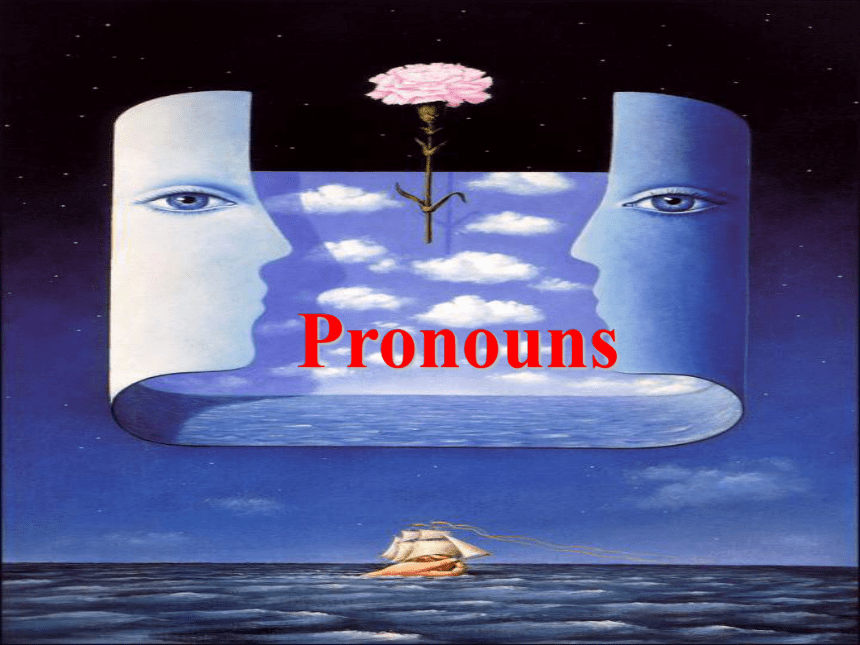
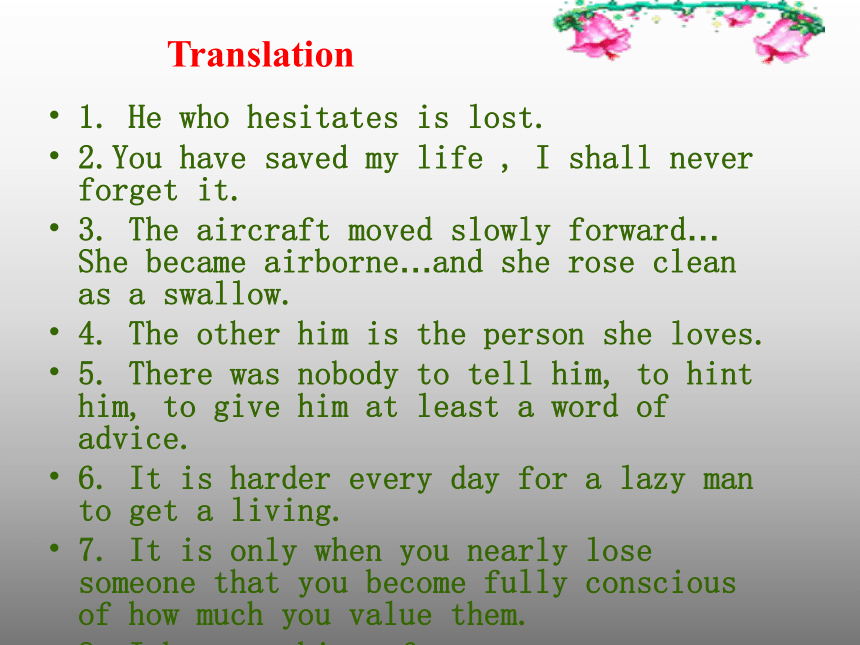
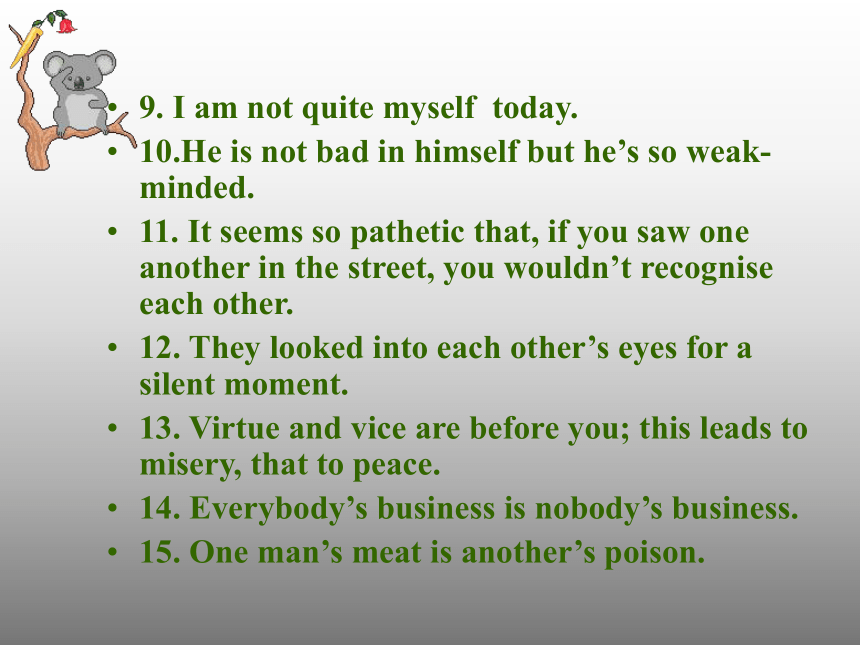
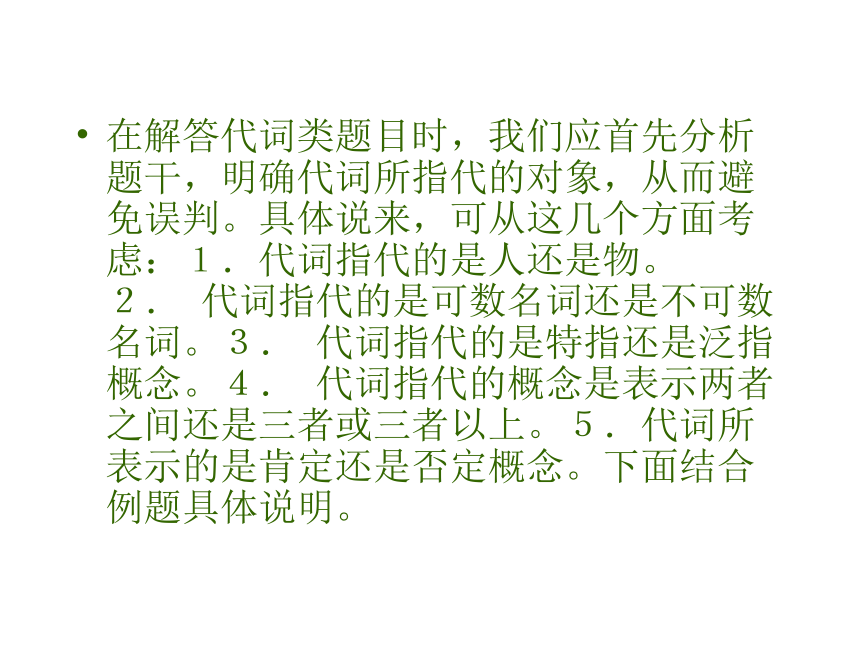
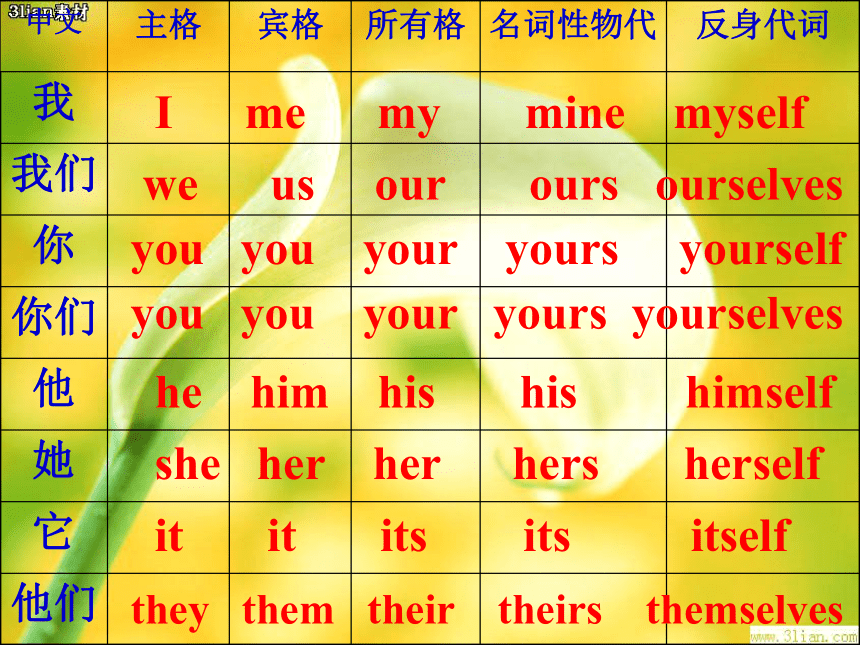
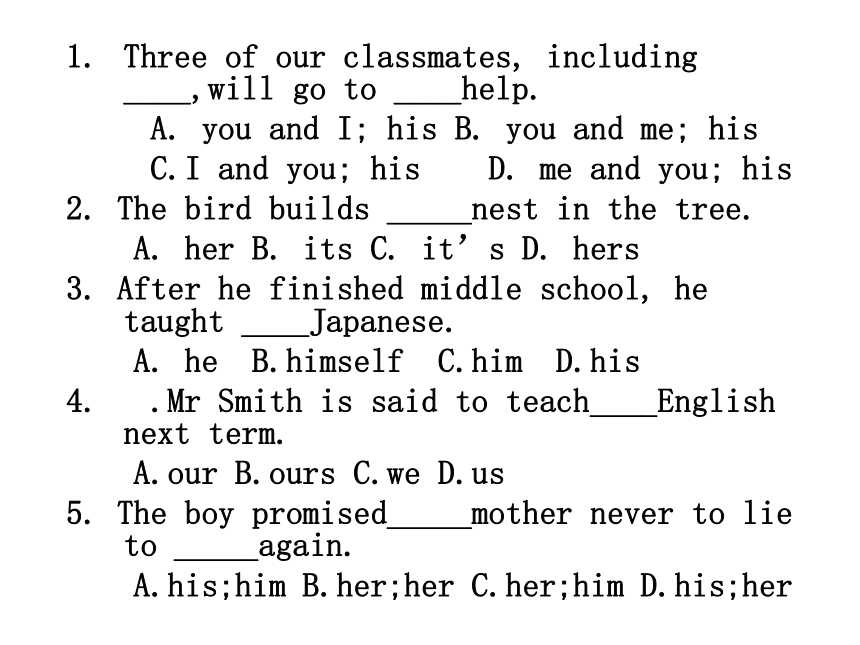
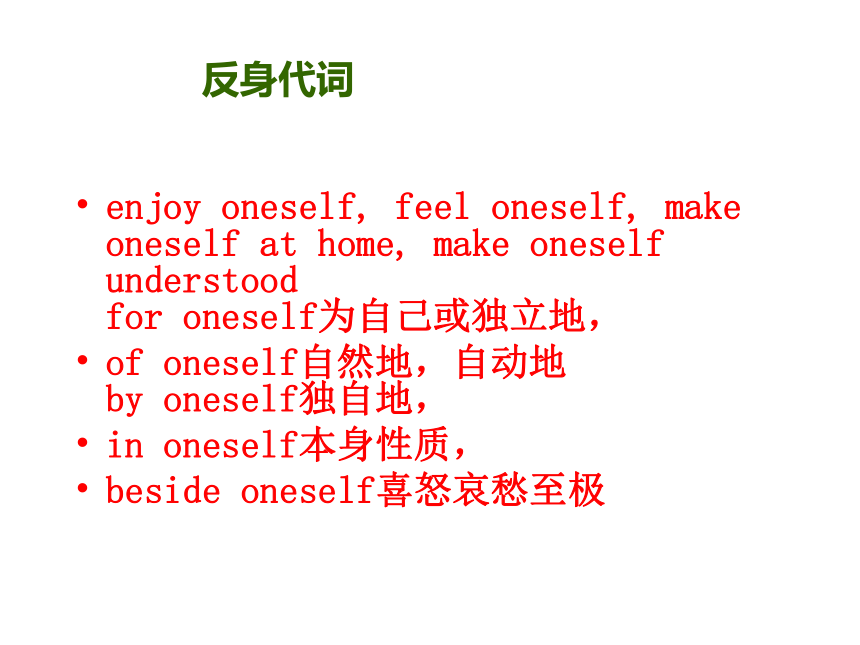
文档简介
课件18张PPT。Pronouns Translation 1. He who hesitates is lost.
2.You have saved my life , I shall never forget it.
3. The aircraft moved slowly forward… She became airborne…and she rose clean as a swallow.
4. The other him is the person she loves.
5. There was nobody to tell him, to hint him, to give him at least a word of advice.
6. It is harder every day for a lazy man to get a living.
7. It is only when you nearly lose someone that you become fully conscious of how much you value them.
8. I have nothing of my own.9. I am not quite myself today.
10.He is not bad in himself but he’s so weak-minded.
11. It seems so pathetic that, if you saw one another in the street, you wouldn’t recognise each other.
12. They looked into each other’s eyes for a silent moment.
13. Virtue and vice are before you; this leads to misery, that to peace.
14. Everybody’s business is nobody’s business.
15. One man’s meat is another’s poison.
在解答代词类题目时,我们应首先分析题干,明确代词所指代的对象,从而避免误判。具体说来,可从这几个方面考虑:1.代词指代的是人还是物。2. 代词指代的是可数名词还是不可数名词。3. 代词指代的是特指还是泛指概念。4. 代词指代的概念是表示两者之间还是三者或三者以上。5.代词所表示的是肯定还是否定概念。下面结合例题具体说明。 I me my mine myself we us our ours ourselvesyou you your yours yourselfyou you your yours yourselves he him his his himself she her her hers herself it it its its itselfthey them their theirs themselvesThree of our classmates, including ____,will go to ____help.
A. you and I; his B. you and me; his
C.I and you; his D. me and you; his
2. The bird builds _____nest in the tree.
A. her B. its C. it’s D. hers
3. After he finished middle school, he taught ____Japanese.
A. he B.himself C.him D.his
4.???.Mr Smith is said to teach____English next term.
A.our B.ours C.we D.us
5. The boy promised_____mother never to lie to _____again.
A.his;him B.her;her C.her;him D.his;her ????
???? enjoy oneself, feel oneself, make oneself at home, make oneself understood for oneself为自己或独立地,
of oneself自然地,自动地 by oneself独自地,
in oneself本身性质,
beside oneself喜怒哀愁至极 反身代词 相互代词 each other指两者之间,
one another指三者或三者以上之间
但现在区分已不明显。 That & those为了避免重复,常用that或those代替前面已提过的名词。 The weather of Beijing is colder than that of Nanjing. The ears of a rabbit are longer than those of a fox. some与any 一般用法:some、any可与单、复数可数名词及不可数名词连有。some一般用于肯定句,any多用于疑问、否定或条件句。 特殊用法: ①any用于肯定句表示“任何”的意思。 Any day is okay for me. ②some用于单数可数名词前表示“某一”。 Smith went to some place in England.(定语) ③在期待对方回答yes 时,some用在表示请求或邀请的问句中。 Would you like some bananas?(邀请) Mum,could you give me some money?(请求) ④some 用于否定句表示部分否定。 I don’t know some of the students.(宾语) some和any在句中还可作状语,作副词。some意为“大约”相当于“about”,而any则表示程度,意为“稍,丝毫”。如: There are some 300 workers on strike. Do you feel any better today? one,both,all one指人或物,“一个”,其复数为ones,指人时,其所有格是one’s,反身代词是oneself. This is not the one I want.(表语) both指人或指物,“两者都” This maths problem can be worked out in both ways.(定语) 注意:both用于否定句,表示部分否定;表示完全否定时,用neither。Both of us are not teachers.我们俩并不都是教师。 Neither of us is a teacher. 我们俩都不是教师。 both不能放在the、these、those、my等之后,而应放在它们的前面。如:Both my parents like this film.
All “全部的”、“整个的”,可与可数或不可数名词连用,除少数情况外,一般不与单数可数名词连用,与复数名词连用时,表示“所有的”、“全部的”,指三个或三个以上的人或物。 He gave me all the money.他把全部的钱给了我。 All the schools are flooded.所有的学校都被淹了。 注意:all 用于否定句,表示部分否定,完全否定用none。如: Not all the ants go out for food.(or:All the ants don’t go out for food.)并不是所有的蚂蚁都出去寻找食物。 None of the money is mine.这钱一分也不是我的。 many和much few, little; a few, a little few和little表示没有多少,含否定意义;而a few 和a little表示有一些,有几个,含肯定意义。另外,few、a few 修饰可数名词;little、a little修饰不可数名词。它们在句中常用作定语、主语和宾语。 no和none no=not any,表示“没有”,用来修饰可数名词或不可数名词,通常作定语,none代替不可数名词作主语时,谓语动词用单数形式;代替可数名词作主语时,谓语动词可用单数也可用复数形式。none还可以在句中作宾语。 注意:none既可以指人又可以指物,no one只能指人。 each和every each(各个),指两个或两个以上的人或物,侧重个体,在句中作主语、宾语、定语和同位语。every(每个),指三个或三个以上的人或物,侧重整体,在句中只能作定语。 Every student it our class has a dictionary.(定语,强调班上“所有的人”) Each student in our class has a dictionary.(定语,强调各个个体) Each of them has been there.(主语) The teacher gave each of the students a new textbook.(宾语) We each got a ticket.(同位语) either和neither either是“两者中任何一个”的意思,可修饰或代替单数可数名词,neither是“两者中没有一个”的意思,可以修饰或代替单数可数名词,它们可在句在作主语、宾语或定语。如: Here are two pens. You may take either of them.(宾语) Neither boy knows French.(定语) other和another, the others 和others the other表示“两者中的另一个”;“the other + 复数可数名词” 表示“其余(他)的……”;the others表示“其他的人或物”。“others及other + 复数名词”泛指“其他的(别的)人或物”。这些词语在句中可作主语、宾语和定语。如: He got two books; one is textbook, the other is a novel. Five of the pencils are red, the others(the other pens)are yellow. Some are singing, others are dancing. another修饰或代替单数可数名词,意为“(三个或三个以上的)另一个”,不能指两者中的另一个,在句中可作宾语和定语。 This coat is too dark. Please show me another.(宾语) Please give me another book.(定语) 注意:another修饰复数名词时,意为“再,又”。如:Please give me another ten minutes. one … another(a second)… a third…the other…意为“一个……一个……一个……一个”用于三者或三者以上的排列。some…others…others…,意为“一些……一些……一些”。 Practice 1. If you want to change for a double room you’ll have to pay_________$ 15.(NMET 2000) A. another B. other C. more D. each
2.My brother is a man of _______words. A. little B. few C. less D. fewer 3. —Can you come on Monday or Tuesday?
—I’m afraid _____ day is possible.
A.either B. neither
C. some D. any
2.You have saved my life , I shall never forget it.
3. The aircraft moved slowly forward… She became airborne…and she rose clean as a swallow.
4. The other him is the person she loves.
5. There was nobody to tell him, to hint him, to give him at least a word of advice.
6. It is harder every day for a lazy man to get a living.
7. It is only when you nearly lose someone that you become fully conscious of how much you value them.
8. I have nothing of my own.9. I am not quite myself today.
10.He is not bad in himself but he’s so weak-minded.
11. It seems so pathetic that, if you saw one another in the street, you wouldn’t recognise each other.
12. They looked into each other’s eyes for a silent moment.
13. Virtue and vice are before you; this leads to misery, that to peace.
14. Everybody’s business is nobody’s business.
15. One man’s meat is another’s poison.
在解答代词类题目时,我们应首先分析题干,明确代词所指代的对象,从而避免误判。具体说来,可从这几个方面考虑:1.代词指代的是人还是物。2. 代词指代的是可数名词还是不可数名词。3. 代词指代的是特指还是泛指概念。4. 代词指代的概念是表示两者之间还是三者或三者以上。5.代词所表示的是肯定还是否定概念。下面结合例题具体说明。 I me my mine myself we us our ours ourselvesyou you your yours yourselfyou you your yours yourselves he him his his himself she her her hers herself it it its its itselfthey them their theirs themselvesThree of our classmates, including ____,will go to ____help.
A. you and I; his B. you and me; his
C.I and you; his D. me and you; his
2. The bird builds _____nest in the tree.
A. her B. its C. it’s D. hers
3. After he finished middle school, he taught ____Japanese.
A. he B.himself C.him D.his
4.???.Mr Smith is said to teach____English next term.
A.our B.ours C.we D.us
5. The boy promised_____mother never to lie to _____again.
A.his;him B.her;her C.her;him D.his;her ????
???? enjoy oneself, feel oneself, make oneself at home, make oneself understood for oneself为自己或独立地,
of oneself自然地,自动地 by oneself独自地,
in oneself本身性质,
beside oneself喜怒哀愁至极 反身代词 相互代词 each other指两者之间,
one another指三者或三者以上之间
但现在区分已不明显。 That & those为了避免重复,常用that或those代替前面已提过的名词。 The weather of Beijing is colder than that of Nanjing. The ears of a rabbit are longer than those of a fox. some与any 一般用法:some、any可与单、复数可数名词及不可数名词连有。some一般用于肯定句,any多用于疑问、否定或条件句。 特殊用法: ①any用于肯定句表示“任何”的意思。 Any day is okay for me. ②some用于单数可数名词前表示“某一”。 Smith went to some place in England.(定语) ③在期待对方回答yes 时,some用在表示请求或邀请的问句中。 Would you like some bananas?(邀请) Mum,could you give me some money?(请求) ④some 用于否定句表示部分否定。 I don’t know some of the students.(宾语) some和any在句中还可作状语,作副词。some意为“大约”相当于“about”,而any则表示程度,意为“稍,丝毫”。如: There are some 300 workers on strike. Do you feel any better today? one,both,all one指人或物,“一个”,其复数为ones,指人时,其所有格是one’s,反身代词是oneself. This is not the one I want.(表语) both指人或指物,“两者都” This maths problem can be worked out in both ways.(定语) 注意:both用于否定句,表示部分否定;表示完全否定时,用neither。Both of us are not teachers.我们俩并不都是教师。 Neither of us is a teacher. 我们俩都不是教师。 both不能放在the、these、those、my等之后,而应放在它们的前面。如:Both my parents like this film.
All “全部的”、“整个的”,可与可数或不可数名词连用,除少数情况外,一般不与单数可数名词连用,与复数名词连用时,表示“所有的”、“全部的”,指三个或三个以上的人或物。 He gave me all the money.他把全部的钱给了我。 All the schools are flooded.所有的学校都被淹了。 注意:all 用于否定句,表示部分否定,完全否定用none。如: Not all the ants go out for food.(or:All the ants don’t go out for food.)并不是所有的蚂蚁都出去寻找食物。 None of the money is mine.这钱一分也不是我的。 many和much few, little; a few, a little few和little表示没有多少,含否定意义;而a few 和a little表示有一些,有几个,含肯定意义。另外,few、a few 修饰可数名词;little、a little修饰不可数名词。它们在句中常用作定语、主语和宾语。 no和none no=not any,表示“没有”,用来修饰可数名词或不可数名词,通常作定语,none代替不可数名词作主语时,谓语动词用单数形式;代替可数名词作主语时,谓语动词可用单数也可用复数形式。none还可以在句中作宾语。 注意:none既可以指人又可以指物,no one只能指人。 each和every each(各个),指两个或两个以上的人或物,侧重个体,在句中作主语、宾语、定语和同位语。every(每个),指三个或三个以上的人或物,侧重整体,在句中只能作定语。 Every student it our class has a dictionary.(定语,强调班上“所有的人”) Each student in our class has a dictionary.(定语,强调各个个体) Each of them has been there.(主语) The teacher gave each of the students a new textbook.(宾语) We each got a ticket.(同位语) either和neither either是“两者中任何一个”的意思,可修饰或代替单数可数名词,neither是“两者中没有一个”的意思,可以修饰或代替单数可数名词,它们可在句在作主语、宾语或定语。如: Here are two pens. You may take either of them.(宾语) Neither boy knows French.(定语) other和another, the others 和others the other表示“两者中的另一个”;“the other + 复数可数名词” 表示“其余(他)的……”;the others表示“其他的人或物”。“others及other + 复数名词”泛指“其他的(别的)人或物”。这些词语在句中可作主语、宾语和定语。如: He got two books; one is textbook, the other is a novel. Five of the pencils are red, the others(the other pens)are yellow. Some are singing, others are dancing. another修饰或代替单数可数名词,意为“(三个或三个以上的)另一个”,不能指两者中的另一个,在句中可作宾语和定语。 This coat is too dark. Please show me another.(宾语) Please give me another book.(定语) 注意:another修饰复数名词时,意为“再,又”。如:Please give me another ten minutes. one … another(a second)… a third…the other…意为“一个……一个……一个……一个”用于三者或三者以上的排列。some…others…others…,意为“一些……一些……一些”。 Practice 1. If you want to change for a double room you’ll have to pay_________$ 15.(NMET 2000) A. another B. other C. more D. each
2.My brother is a man of _______words. A. little B. few C. less D. fewer 3. —Can you come on Monday or Tuesday?
—I’m afraid _____ day is possible.
A.either B. neither
C. some D. any
